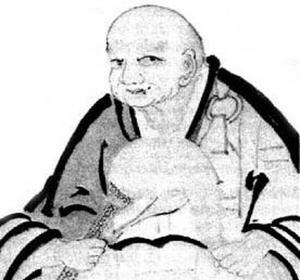 Currently, there is much talk in the Zen blog world about how old one needs to be to teach Zen. See James Myoun Ford’s post here.
Currently, there is much talk in the Zen blog world about how old one needs to be to teach Zen. See James Myoun Ford’s post here.
I’ll only get into a part of the issue, of course, because I’m doing a “Hakuin-focus blog year.” In that spirit, I’ll get around to what seems to have been his view on this and some hopefully-timely advice as well. But first the issue of what “wisdom” is.
Partly, this is a translation issue and shows how translation impacts how we think. Those who see “wisdom” as something acquired with age, something the English word certainly suggests (“the quality of having experience, knowledge, and good judgment”), also then tend to think that only an older person should teach Zen or anything that is about wisdom.
However, the word that’s generally being translated as “wisdom” is “prajna.” Buswell and Lopez in their wonderful The Princeton Dictionary of Buddhism say that it is “…perhaps closer to ‘gnosis’ (‘knowledge of spiritual mysteries’), ‘awareness,’ and in some contexts ‘cognition’; the term has the general sense of accurate and precise understanding, but is used most often to refer to an understanding of reality that transcends ordinary comprehension.”
“Wisdom” as an understanding that transcends ordinary comprehension has nothing to do with age. So a very young person could be a Zen teacher if what you’re looking for, and I hope to Buddha this is foremost for you, is someone who has had this wisdom experience and who can help you realize this prajna too. In Zen, we generally call this wisdom experience “kenshō.”
Now, in our day, after an initial kenshō, years of subsequent kōan study are devoted to the tangled thicket of thorns we refer to in our system as “the Harada-Yasutani Kōan Curriculum.” This period is really important. And then after “completing” the training, some additional time just shutting up is also a good idea. James’ post points this out too.
So even if a person were to start at twenty-one, establish their zazen seat, find a teacher, kenshō at about twenty-five, complete the curriculum by thirty-five, and have some “under the bridge time” for at least a few years – well, they’ll be forty by the time they begin.
By the way, as Tetsugan has pointed out, we see this follow-up digestion time in most of the ancients’ biographies too, including for Dōgen and Hakuin.
In my case, I received my first transmission from Katagiri Rōshi when I was just a boy of thirty-three, having had some kenshō, but not being well-cooked by any means. I then went to Japan and did some monastic practice, then waited for all of about a year before starting to teach. Way too soon! Subsequently, I learned the way I’ve learned most everything – through the school of hard knocks. Fortunately, due to the generosity and kindness of a handful of clear teachers, especially James, I’ve been able to continue bumbling along.
These days in the American Zen scene, the whole “wisdom/prajna/kenshō” criteria for being a teacher has receded in importance, especially, it seems to me, in the just-sitting Sōtō lineages. Often, in these lineages, long-practice and affiliation (finding someone who will do the ceremony) seem more important, with the former sometimes being much less important than the latter. So “consumer beware!” The wisdom you are being offered by a Zen teacher might be more of the ordinary variety.
What seems to have been Hakuin’s view?
Hakuin is very clear and repeats himself often. First, realize kenshō as clear as the palm of your hand. Then clarify and refine this kenshō by working through the old, hard-to-pass-through kōans and the sutras in order to have the dharma-clarity and way-power to benefit others. Hakuin emphasizes many times that in his view our “…own enlightenment is but the first step in [our] career of assisting others to attain theirs.”
And, finally, some advice from Hakuin that I wished I received and actually followed (for a change):
“Students who have not yet penetrated to the source should not be troubled if their entrance into enlightenment is slow in coming, but they should worry if their practice is not pure and genuine. Students who have already penetrated to attainment should not be troubled if people fail to revere them, but they should be concerned about the difficulty of achieving practice that is pure and genuine” (Complete Poison Blossoms in a Thicket of Thorn, 187. To Layman Ishii).
________________












